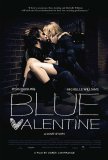Blue Valentine (United States, 2010)
January 15, 2011
Despite the fact that 50% of all marriages end in divorce, no one walks to the altar with considerations other than a lifetime of shared happiness. It's a pleasant fantasy, since even the best unions are fraught with bad times and difficulties. Hollywood, with its insistent selling of idealized romance, is an accomplice in the development of the unreasonable expectations of some from the institution of marriage. Motion picture love stories are great entertainment as long as they are seen for what they represent: fairy tale simplifications of complex situations. Blue Valentine offers a refreshingly honest perspective of a situation in which "happily ever after" does not apply. An autopsy of a failed marriage, it contrasts the giddy honeymoon beginning with the sad denouement after dysfunction has devastated the groundwork of hope and newness.
When we first meet Dean (Ryan Gosling) and Cindy (Michelle Williams), they are approaching middle age. Actually, with his balding head and the cigarette dangling from his lips, he looks like he's already there. Better dressed and with a greater care for her appearance, she still shows the fading bloom of youth. They share a young daughter who loves them both and isn't aware of the tension between Mommy and Daddy. As the film progresses, the already strained relationship begins to come apart at the edges as a one-night getaway for Dean and Cindy turns into anything but a romantic vacation. With their marriage approaching its breaking point, they remember how it all began - their first meeting, the heat of early sexual encounters, Dean's introduction to Cindy's family, and the courthouse wedding. What happens in between, and how the couple detours from promising beginning to wistful end, is not explicitly detailed, but there are enough clues to provide a sense of what the deterioration entailed.
Annie Hall, despite being a lighthearted love story, is disliked by some romantics because it lacks the one element to make the fantasy complete: the happy ending. Such a caveat applies here, although under no circumstances could Blue Valentine be categorized as a comedy. It's a drama and one of a particularly challenging sort. Like all good dramas, it makes one consider how aspects of the characters' lives and relationship might be like (or unlike) the viewer's. Director Derek Cianfrance, working from a screenplay he co-wrote with Cami Delavigne and Joey Curtis, allows us to appreciate the cute moments of the early relationship but only after their joy has been filtered through the knowledge of what is to come. Blue Valentine is not a complete downer, but it glares unflinchingly at the reasons underlying the collapse of Dean and Cindy's union.
Blue Valentine is driven by dialogue and fueled by performances. There's a great deal of intensity in the acting and some of the confrontations between Dean and Cindy are difficult because of the amount of feeling brought to their roles by Ryan Gosling and Michelle Williams. Both characters, although flawed, are sympathetic, and there is no physical abuse in the relationship to stack the deck one way or another. We can see both sides and there's pain and blame to go around. Gosling and Williams play well off one another. They are strong, respected thespians, with Gosling having earned a deserved Oscar nomination for Half Nelson, and Williams having given one of the best under-the-radar portrayals in recent years for Wendy and Lucy. Here, they are in top form. Most importantly, they provide the personality continuity necessary because of the non-linear and fragmented structure of the narrative. The Dean and Cindy at the chronological beginning of their story are the same people as at the end, even though both have fundamentally changed in the ways in which they relate to one another.
To an extent, Blue Valentine has fallen victim to its distributor's financial difficulties. Unable to give it the kind of backing they once lavished upon less deserving productions, the Weinsteins have pushed it into a limited number of theaters with minimum marketing. It's not out of the question that Gosling and Williams will be accorded Oscar nominations - their performances linger in the minds of anyone who sees the movie - but Harvey lacks the deep pockets to properly support his film. Blue Valentine received a little free publicity from the MPAA's initial decision (reversed on appeal) to award an NC-17 rating, even though there's nothing in the movie deserving of such a restrictive certification (the sex scenes are no more racy than those in dozens of R-rated mainstream features). If nothing else, that may have generated some prurient curiosity about the movie. Whatever the motivation for seeing it, however, Blue Valentine deserves to be seen. The cumulative experience leaves an aftertaste that, although not bitter, is too strong to be easily washed away. That's the mark of a worthwhile motion picture.
Blue Valentine (United States, 2010)
Cast: Ryan Gosling, Michelle Williams
Screenplay: Derek Cianfrance & Cami Delavigne and Joey Curtis
Cinematography: Andrij Parekh
Music: Grizzly Bear
U.S. Distributor: The Weinstein Company
U.S. Release Date: 2011-01-14
MPAA Rating: "R" (Sexual Content, Nudity, Profanity, Violence)
Genre: DRAMA
Subtitles: none
Theatrical Aspect Ratio: 1.85:1

Comments